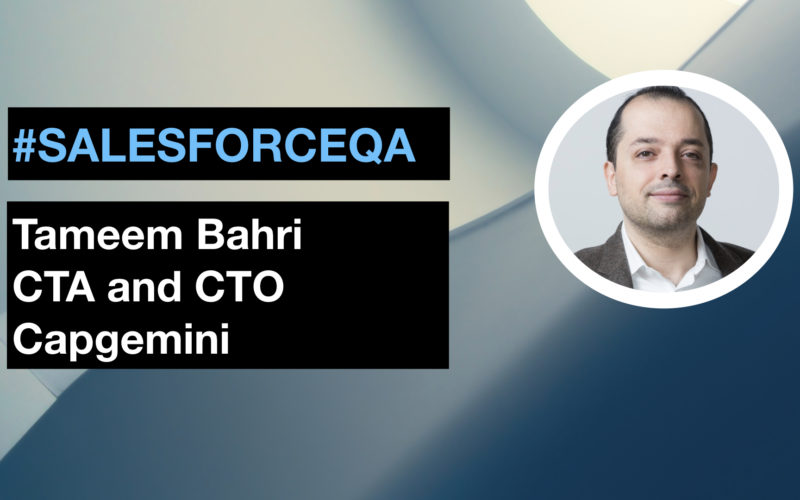In our most recent #SalesforceQA, we caught up with Salesforce Certified Technical Architect, Tameem Bahri. Tameem is the CTO of the European office at Capgemini, providing consulting, technology, professional, and outsourcing services.
Tameem discusses the ever-present skills gap in the Salesforce ecosystem and how businesses can work towards closing this by investing in their people. As well as this, he talks about diversity in tech and reveals the best piece of advice he’s received throughout his career.
Salesforce Republic (SR): To kick-off, could you tell us a bit about your career and how you got to where you are today?
Tameem Bahri (TB): Sure, my journey is a bit of a weird one. I came from an engineering and software development background. My career began as early as 2000, working as a freelancer and part-timer while at the university. After graduating I worked for several software development houses designing and developing enterprise solutions using, what was at that time, cutting-edge technologies such as MS .NET and Borland Delphi.
It was around 10 years ago that my Salesforce journey began. I joined a Salesforce client (the biggest in the GCC region at that time) and found myself completely of my comfort zone. I had to learn a totally new technology entirely from scratch, which hated at the beginning and tried to fight back. Then, after a few weeks, I became fascinated with the platform. There is nothing that impresses a geeky architect, such as myself, more than a properly designed software. And I decided that it was the technology I wanted to work with for the upcoming years of my career.
SR: Achieving the CTA is a difficult task, how did you decide that it was the right path for you?
TB: It is difficult indeed. I believe that the key success factor is to find the right motive for yourself. In my case, it was the recognition, the desire to join the club. I wanted to get that certificate as proof, to myself first, that I have got what it takes.
SR: What advice do you have for others looking to start their journey towards becoming a CTA?
TB: Firstly, I’d say it’s so important to find the right motive for you. The desire to complete the CTA has to come from you, not your client or employer. It’s not an easy journey and without the right fire, you will run out of steam. Be humble, listen to others and keep learning. Be honest with yourself and don’t risk setting the review board unless you’re fairly confident of your chances.
SR: In your experience, what are some of the key traits that are needed in order to be successful as a Salesforce CTA?
TB: Grit, confidence, self-motivation. Willingness to learn is key, as is the flexibility to change and even unlearn on some occasions. You need to have a passion for technology. Keep yourself organised and try to have a clear vision of what it is that you want to achieve. Oh! and did I mention grit? Lots of grit!
SR: What’s your opinion on certifications as a whole? Do you think they are essential for success in the ecosystem?
TB: Certificates are a trusted third party assertion that you’re likely to hold the expected set of skills and experience required to do the job. Some certs have more credibility than others, making them much more valuable in the market.
Salesforce certificates can definitely help you to progress in your career. However, if you lack the actual knowledge to back it up then it provides a negative impact. In my opinion, if you have the knowledge, then you should go for the cert and not the other way round.
SR: Recently there’s been a lot of talk around the increasing skills gap in Salesforce and tech talent. Would you say that you have recognised a shortage of skills in the sector?
TB: There is without a doubt a shortage of skills in this sector. The Salesforce market is growing faster and larger every year. Which of course, will create gaps in the skills available. Especially with all the acquisitions we’re seeing as well.
SR: How are you tackling this at Capgemini?
TB: At Capgemini we’re tackling the skills gap on multiple fronts. We recently started a program to train our future CTAs, and we have very ambitious targets for this. We’re also working on several other initiatives to speed up the training process for our new joiners. It’s important for businesses to invest in the future pipeline of tech talent. Investment in people will help to close the skills gap that we’re currently faced with.
SR: What are your suggestions for businesses and the wider tech community when it comes to working towards closing the skills gap?
TB: It’s a fast-moving business. Companies should work to introduce their own training programs depending on their market strategy. Some might focus on fresh grads, others might focus on converting senior tech specialists from other technologies.
There’s also a need to understand the special nature of this technology and – accordingly – define a clear career path for all types of resources. If you don’t understand the different skills of your people, and if you don’t make room for all of them, they will simply leave.
SR: Diversity has been another hot topic in tech recently. In your opinion, how can businesses and communities encourage more diversity in the Salesforce ecosystem and the wider world of tech?
TB: When minorities feel they belong in a company and are included in decision-making, they’re more likely to seek out opportunities within such a firm. Having the right diverse, talent-attractive environment and people creates a snowball effect. More talented people are likely to join your firm as a result of you creating a welcoming workplace. Family-friendly policies and more significant emphasis on work-life balance will create an attractive environment for all backgrounds.
A more diverse workforce will lead to better products that can address a wider range of customers. These may be older, differently-abled and from different ethnic and socio-economic backgrounds
SR: Finally, what is the best piece of advice you have received throughout your career in tech?
TB: It wasn’t advice, but more of a role model. The founder of the first company I worked at (a small startup) was a tireless person. Always active, full of energy, and smiling. No matter how many hits he had in life (and there were many), he would always get back up. Watching him was the best lesson I have had in my career. His attitude taught me to never give up, stay positive, and enjoy what you do.
If you’re a Salesforce professional and would like to join Tameem Bahri, CTA and CTO at Capgemini, in our Q&A series, please get in touch with us today!


